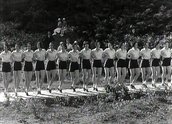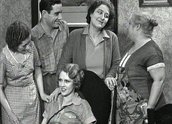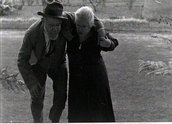


The Hayseeds (1933)
Synopsis
In the middle of a bad drought, Dad Hayseed (Cecil Kellaway) and his large family host a wealthy city family, the Townleighs, when Mary Townleigh (Shirley Dale) gets lost briefly in the bush. To celebrate the marriage of Joe Hayseed (Tal Ordell) and his sweetheart Pansy Regan (Molly Raynor), the Hayseeds visit Sydney to stay with their new friends. Mary Townleigh’s romance develops with an exiled Englishman, John Manners (Arthur Clarke), who lives near the Hayseeds. A cable from England makes serious allegations against Manners, but Dad Hayseed defends his friend’s reputation, until the truth clears his name.
Curator’s notes
Beaumont Smith, one of the most prolific of the silent era directors, believed that a good idea was worth repeating, so this is the seventh of his films about the Hayseeds, a comical rural family very much borrowed from the ‘Dad and Dave’ mould. The first Hayseed film, Our Friends, the Hayseeds was made in 1917, before the first film version of On Our Selection (1920), but Steele Rudd’s 1895 stories had been popularised on stage by Bert Bailey from as early as 1912, and another series of books about a rural family, ‘The Waybacks’, had been popular since 1902. Six of the seven Hayseeds films were silent, the last of those, being Prehistoric Hayseeds (from 1923).
Beau Smith decided to revive the series in the sound era after the great success of Ken G Hall’s On Our Selection in 1932. He even shot it in the same studio, Cinesound at Bondi, and used Tal Ordell, who played Dave in the first On Our Selection, to play Joe Hayseed, the eldest son of the dynasty. The film is an hilarious mixture of things. Beaumont Smith was nothing if not versatile, so we get an opening scene featuring a tap dancing chorus of fit young women in shorts, tapping in the wilderness and disturbing Dad Hayseed’s cows; we get a singing prospector who’s also the lost heir to an English fortune; the film’s finale even features a Busby Berkeley style sequence, with overhead shots of the dancing girls in a circle.
Most of the film centres on comedy, and that is carried mostly by Cecil Kellaway’s lovely performance as the slow-talking but wise Dad Hayseed. Kellaway makes a lot more of the character than one expects, shading in Dad’s prickly nature, his disappointment with his dopey set of children, but also his overwhelming generosity of spirit and stoic resolve against adversity. He has a couple of rousing speeches, calculated to appeal to nationalistic self-delusion, but Kellaway manages to convey a fundamental decency in the character that’s much more poignant than words.
Raymond Longford, who made the original On Our Selection was supposed to direct the film, but Beaumont Smith replaced him. Longford is credited as associate director. His career was already in steep decline; as he saw it, that was mainly because of his denunciations of the 'Combine’, the most powerful company in the Australian film industry at the time. The film made money but it was the last of the Hayseeds series. Smith directed only one more film (see Splendid Fellows). He died in 1950.
- Overview
- Curator’s notes
- Video 3 clips

- Principal credits
- Find a copy
- Comments 1
- Add your review



